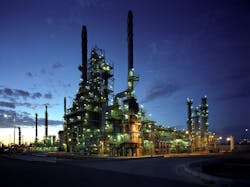bp lets contract for renewable fuels project at former Australian refinery
bp plc has let a contract to Honeywell UOP LLC to license technology for conversion of existing but idled hydroprocessing equipment as part of the preliminary front-end engineering design (pre-FEED) phase for a proposed renewable diesel and sustainable aviation fuel (SAF) project at the operator’s former refinery in Kwinana, south of Perth, on Australia’s western coast.
As part of the contract, UOP will deliver licensing of its UOP-Eni SPA codeveloped proprietary Ecofining process technology to revamp conventional and underutilized hydroprocessing equipment at the site for production of 10,000 b/d diesel and SAF from renewable feedstocks, the service provider said on Feb. 28.
Still under development and aligned with bp’s broader goal of becoming a net-zero company by 2050 or sooner, the planned renewable diesel and SAF project would be integrated with the operator’s existing terminal operations at Kwinana, bp and UOP said.
“[T]his renewable diesel and SAF project will leverage existing infrastructure, including former refining assets, storage, and distribution facilities, and a team with extensive operational capabilities and experience,” said Justin Nash, senior manager for bp’s Corporate & Cities Integrated Solutions division.
Alongside contributing to bp’s achievement of a net-zero future, the proposed project also comes as part of the company’s ambition to develop an integrated clean energy hub at Kwinana, according to Nash.
Further details regarding the previously announced Kwinana renewable diesel and SAF project, including an estimated timeframe for its implementation, have yet to be revealed (OGJ Online, Sept. 7, 2021).
bp announced in late 2020 its decision to shutter refining operations at Kwinana and convert the site into a fuel import terminal amid poor refining margins resulting from an oversupply of finished products in the region (OGJ Online, Oct. 30, 2020).
About the Author
Robert Brelsford
Downstream Editor
Robert Brelsford joined Oil & Gas Journal in October 2013 as downstream technology editor after 8 years as a crude oil price and news reporter on spot crude transactions at the US Gulf Coast, West Coast, Canadian, and Latin American markets. He holds a BA (2000) in English from Rice University and an MS (2003) in education and social policy from Northwestern University.

